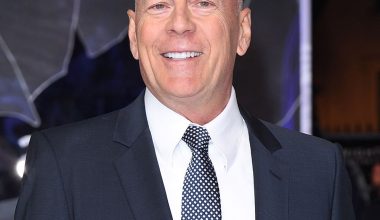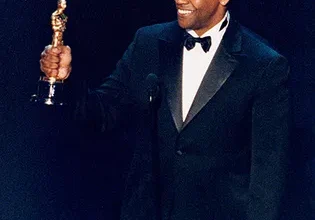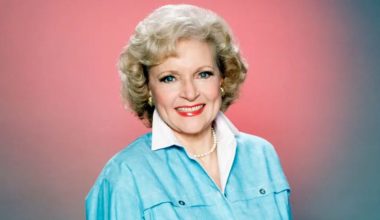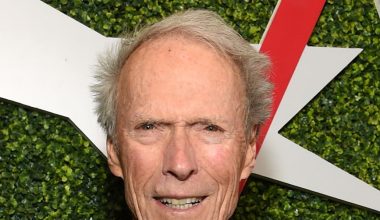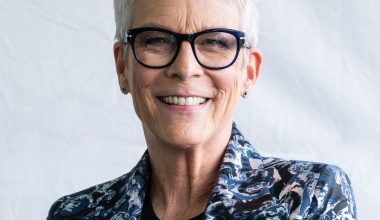Born on April 7, 1954, Chan Kong-sang, better known by his stage name Jackie Chan, is a well-known actor, director, writer, producer, martial artist, and stuntman from Hong Kong. He is renowned for his inventive stunts, which he usually does on his own, and his comedic acrobatic fighting style.
He was one of the Seven Little Fortunes from the China Drama Academy at the Peking Opera School, where he studied acting, acrobatics, and martial arts, before joining the film industry. Chan began his acting career in the 1960s and has performed in over 150 movies. He is among the most significant action movie stars in history.
Quick Facts About Jackie Chan
- Birth Name: Chan Kong-sang
- Birth Date: April 7, 1954
- Birth Place: British Hong Kong
- Gender: Male
- Career: Martial Artist, Actor, Producer, Director, Stunt Performer/director, Singer
- Most Known For: Jackie Chan is an actor and martial artist who has become well-known around the world because to his distinctive style of fusing hilarious physical humour with excellent martial skills. His best-known films are Drunken Master, The Accidental Spy, Rush Hour 2, The Forbidden Kingdom, The Karate Kid, and Snake in the Eagle’s Shadow.
Early Life
Chan Kong-sang was born in British Hong Kong on April 7, 1954, to political refugees Charles and Lee-Lee Chan, who had fled the Chinese Civil War. Chan changed his Chinese name to Fang Shilong and his surname from Fang to Chan after learning that his father was Fang Daolong, a former secret agent for Lieutenant General Dai Li who escaped to British Hong Kong in the 1940s.
Chan was raised on the grounds of the French consul’s mansion in British Hong Kong’s Victoria Peak, where his father was employed as a chef. Chan’s father moved to Canberra, Australia in 1960 to take a job as the chief cook for the American embassy. After graduating from Nah-Hwa Primary School on Hong Kong Island, Chan continued his education at the China Drama Academy, a Peking Opera School directed by Master Yu Jim-yuen.
Chan studied singing, acting, acrobatics, and martial arts for the following ten years while being strictly disciplined and even physically punished for subpar work. At the age of eight, he made his screen debut in the 1962 Cantonese film Big and Little Wong Tin Bar. He went on to participate in more musical films.
After graduating in 1971, Chan worked as a stuntman and acrobat in movies, most notably Fist of Fury (1972), which starred Bruce Lee, the resident big-screen celebrity of Hong Kong. He apparently achieved the greatest fall in Chinese film industry history with the movie, garnering the admiration of notable figures like the fearsome Lee.
Breakthrough with leading roles
Chan was identified as the most probable candidate to take over Lee’s position as the undisputed king of Hong Kong film following his terrible and untimely death in 1973. In order to do this, he acted in several kung fu films alongside Lo Wei, a producer and director who had previously collaborated with Lee in the movies New Fist of Fury, he 1978 film Snake in the Eagle’s Shadow, Drunken Master, Half a Loaf of Kung Fu, Spiritual Kung Fu and Fearless Hyena.
By then, Chan had made up his mind to reject the Lee persona and forge his own identity. Chan discovered his own recipe for cinematic gold by fusing his martial arts skills with remarkable nerve—he insisted on carrying out all of his own stunts—and a sense of screwball physical humour reminiscent of one of his idols, Buster Keaton.
Chan quickly rose to the position of highest-paid actor in Hong Kong and gained immense recognition beyond Asia. He had complete influence over the majority of his movies, frequently handling everything from producing to directing to singing the theme music. Chan then breached his contract to join Golden Harvest during the filming of Fearless Hyena Part II.
The Big Brawl
Chan made a fruitless attempt at breaking into Hollywood in the early 1980s. He starred in the critically panned 1980 film The Big Brawl, produced by Golden Harvest. Alongside Burt Reynolds, he also starred in a few minor parts in the ensemble comedies The Cannonball Run (1982) and its 1984 follow-up.
Once again, Chan’s reputation grew in Hong Kong. This is because he made some very good action comedies, including Police Story (1985), Project A (1983), and Armour of God (1986). He also made the popular period picture Mr. Canton and Lady Rose (1989), which was a very smart re-imagining of Frank Capra’s 1961 film A Pocketful of Miracles.
In addition, the actor established the Jackie Chan Stuntmen Association, offering its members personal training and medical coverage, following many stuntmen injuries sustained during the production of Police Story. Chan, on the other hand, says that during stunts he has at least once fractured every bone in his body. He attempted to jump from the top of a structure to a tree limb below, but fell more than forty feet, breaking his skull during the 1986 Armour of God shooting.
Chan expanded his cinematic horizons in the early 1990s, giving a rare dramatic performance in the melodramatic Crime Story (1993). In addition, he produced several Drunken Master and Police Story sequels. Chan’s profile took off in the mid-1990s, when a number of factors came together to make him more well recognized in the United States, even though he was still mostly unknown at that time.
Finding Fame in Hollywood
In the 1990s, Chan revived his desire to work in Hollywood, although he turned down early offers to play antagonists in movies to avoid being stuck in one character for too long.
Jackie Chan’s comic book character, Spartan X, debuted on newsstands in the United States and Asia in 1995. Chan invented the character himself. In the same year, Chan received a Lifetime Achievement Award from MTV Movie Awards’ freshly discovered directorial sensation Quentin Tarantino, who had just made his breakthrough with Pulp Fiction (1994).
Rumble in the Bronx, Chan’s first hit in America and his sixth English-language (dubbed) release, was co-released in 1996 by New Line Cinema and Golden Harvest. The movie shot to No. 1 at the box office with $10 million in its first weekend of sales. Crime Story and Drunken Master II, two of Chan’s earlier films, made their American premieres as a result of the movie’s popularity.
Jackie Chan had two less successful films, Mr. Nice Guy (1998) and First Strike (1997), before scoring another box office blockbuster with the action comedy Rush Hour (also 1998), which was produced in the United States. Chan used his fluency in English to work as a Chinese police officer in Rush Hour, partnering with Chris Tucker, a budding comic, as a streetwise Los Angeles cop.
Chan co-starred with Owen Wilson and Lucy Liu in Shanghai Noon, an action comedy set in the Old West that was released in 2000. He then reteamed with Tucker for Rush Hour 2, the sequel, the following summer. For the role, the action hero received a healthy $15 million in addition to a portion of the film’s unprecedented box office receipts. In the comedy The Tuxedo (2002), Chan featured with Jennifer Love Hewitt as a taxi driver who gains superhuman abilities by dressing in his boss’s tuxedo. In the same year, he was bestowed with a star on the Hollywood Walk of Fame and won the World Stunt Awards’ Taurus Award for greatest action movie star.
‘Shanghai Knights,’ ‘New Police Story,’ ‘Kung Fu Panda,’ and ‘The Forbidden Kingdom’
After that, Chan released Shanghai Knights (2003), another somewhat successful sequel. However, The Medallion (2003) and the Around the World in 80 Days (2004) adaption were a complete bust. In 2004, he co-founded JCE Movies Limited to have more creative and financial control over his films. With this company, he produced the popular Hong Kong films Rob-B-Hood (2006), The Myth (2005), and New Police Story (2004).
Chan returned to a well-known role in Rush Hour 3, which was released in 2007. He voiced Master Monkey in the immensely popular 2008 animated film Kung Fu Panda, which subsequently inspired a computer game, a TV show, and other sequels. He costarred in The Forbidden Kingdom that year alongside Jet Li, another well-known Chinese action actor.
‘The Karate Kid,’ ‘Little Big Soldier,’
Following its release in the United States, Chan starred in family-friendly films including The Spy Next Door (2010) and an update of The Karate Kid (2010).
Chan’s debut dramatic feature in the US was this one. He portrays Mr. Han, a maintenance worker and kung fu expert who trains Jaden Smith’s character in the art of self-defense against bullies at school. In 2011, he was honoured with the Nickelodeon Kids’ Choice Awards’ Favourite Buttkicker title for his performance in The Karate Kid.
Chan, meanwhile, was doing well and became a cornerstone of Chinese film. He appeared in the 2009 criminal thriller Shinjuku Incident as the lead actor. In 2010, he developed and directed the action comedy Little Big Soldier. He finished a challenging assignment in 2011 by co-directing and starring in the historical drama 1911.
Recent Roles
Chan returned to action mode in CZ12 (2012), and in Police Story 2013, he returned to his former franchise. With Dragon Blade, a 2015 3-D historical action picture starring Adrien Brody and John Cusack, he made a ton of money at the box office.
Chan starred in two Anglo-Chinese productions: the 2017 action-thriller The Foreigner and the 2016 action-comedy Railroad Tigers. In addition, he acted in the science fiction picture Bleeding Steel (2017). Then, he collaborated with John Cena to feature in the Chinese-American co-production Hidden Strike, which was released in 2023.
By 2021, his movies had brought in about CN¥14 billion (US$2.17 billion) in China and US$1.84 billion (more than US$2.44 billion with inflation) in the US and Canada.
Personal Life
Chan wed Taiwanese actress Lin Feng-jiao, popularly known as Joan Lin, in 1982. Actor and singer Jaycee is their only child. Chan is also said to have fathered a daughter, born on January 18, 1999, through an affair with a former Miss Asia. It grew into a media controversy that he was not proud of.
Chan is a well-known philanthropist who supports issues such as animal welfare, conservation, and disaster relief. He said in 2006 that upon his death, he would leave half of his possessions to charity. The actor was elected Singapore’s first anti-drug ambassador in 2015, and he has been a UNICEF Goodwill Ambassador since 2004.
Conclusion
Jackie Chans life and career showcase his unwavering commitment, to the art of movie making and arts. His path from training at the Peking Opera School to stardom is defined by his creative action sequences and comedic timing. Chans talent for blending humor with action along with his dedication to performing his stunts has endeared him to audiences worldwide. His strong work ethic and ability to take on roles have not made him a top earning actor in Hong Kong but also a cherished figure, in the global film industry. Beyond his films Jackie Chans influence extends to inspiring individuals to pursue their dreams with bravery and a dash of humor.


